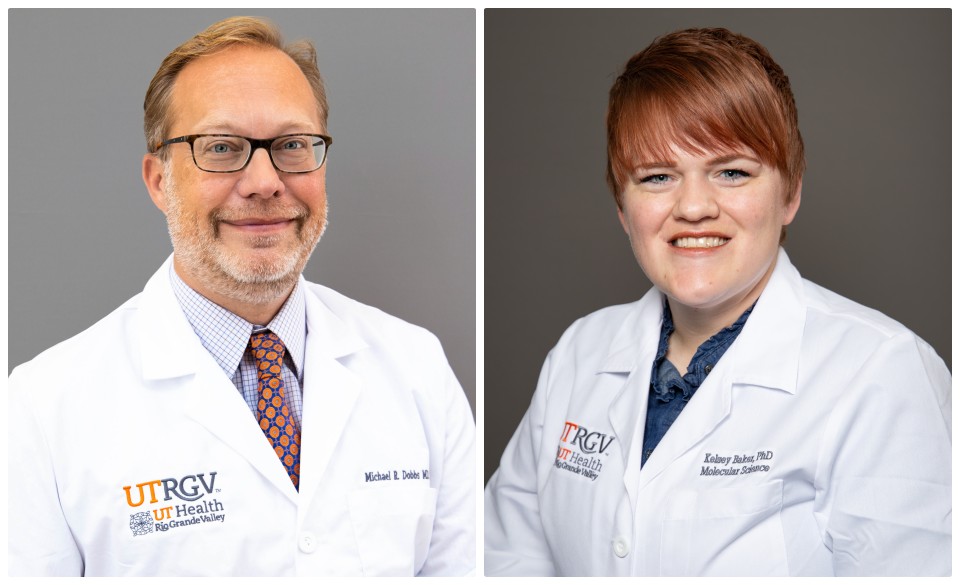By News and Internal Communications
By Maria Gonzalez
RIO GRANDE VALLEY, TEXAS – June 2, 2022 – Dr. Michael R. Dobbs, professor and chair of the Department of Neurology in the UTRGV School of Medicine, has been awarded a $443,963 grant to research the motor recovery, along with the brain and spine degeneration, of 30 stroke survivors over the next three years.
The grant was awarded by the National Institute of Neurological Disorders and Stroke (NINDS), which is part of the federal government’s National Institutes of Health (NIH).
Dobbs said the R15 NIH grant will allow him to study whether degeneration after a stroke affects some areas of the brain more progressively than others, and whether that degeneration extends to the level of the spinal cord.
“We want to determine how this degeneration impacts the ability to move the first three months after a stroke,” Dobbs said.
The project, titled “Role of Alternative Sensorimotor Pathway Degeneration in Motor Function of in Acute Stroke,” will be led by principal investigator Dobbs, and co-PI Dr. Kelsey Baker, assistant professor in the Department of Neuroscience at the UTRGV School of Medicine.
Baker said it is estimated that, by 2030, an additional 3.4 million adults will experience a stroke.
“White Hispanic males are projected to experience the highest rates,” she said, “In addition, preliminary estimates from our work suggest that stroke is a particular concern in South Texas and the Rio Grande Valley.”
Dr. Thomas Spencer, associate vice president for UTRGV’s Division of Research, said the division fully supports the work Dobbs and his research team are doing.
“Their search for advancements in the diagnosis and treatment of patients needing neurological care is important – and in many cases critical – not just to patients in the Valley, but around the world,” he said.
This federal funding will provide the means to collect high-resolution and advanced neuroimaging protocols (MRI) through one of the first studies to capture neuronal pathway changes in the spinal cord in acute stroke. The study will be conducted at the newly established UTRGV Institute of Neuroscience in Harlingen.
NEUROLOGY AND NEUROSCIENCE TRAINING FOR THE NEXT GENERATION
NIH grant reviewers called the grant application “a highly translational application from an experienced clinician-scientist that could produce some intriguing new clinical science for stroke survivors, while creating an outstanding training opportunity for students at UTRGV…”
Dobbs said this Research Enhancement Award Program (REAP) project will provide a valuable opportunity for medical students to be exposed to hypothesis-driven research within the Valley. It also will enhance the UTRGV-NIH research portfolio and provide medical students and undergraduate students opportunities to be at the forefront of research data collection and presentation.
“Additionally, the work will lead to publications in scientific journals,” Dobbs said, “and could lead to additional funded projects through other NIH mechanisms.”
The grant lasts through March 31, 2025.
ABOUT UTRGV
The University of Texas Rio Grande Valley (UTRGV) was created by the Texas Legislature in 2013 as the first major public university of the 21st century in Texas. This transformative initiative provided the opportunity to expand educational opportunities in the Rio Grande Valley, including a new School of Medicine and a School of Podiatry, and made it possible for residents of the region to benefit from the Permanent University Fund – a public endowment contributing support to the University of Texas System and other institutions.
UTRGV has campuses and off-campus research and teaching sites throughout the Rio Grande Valley including Brownsville (formerly The University of Texas at Brownsville campus), Edinburg (formerly The University of Texas-Pan American campus), Harlingen, Weslaco, McAllen, Port Isabel, Rio Grande City and South Padre Island. UTRGV, a comprehensive academic institution, enrolled its first class in the fall of 2015; the School of Medicine welcomed its first class in the summer of 2016, and the School of Podiatric Medicine in the fall of 2022.

